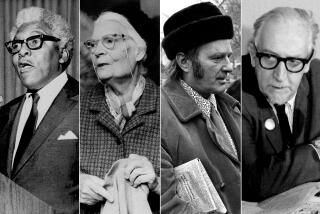A breed of politician that is facing extinction
- Share via
“American Idealist: The Story of Sargent Shriver” is not a title that prepares you for an hour and a half of heartbreak and indignation. But watching this Chicago Video Project biopic about the man who launched the Peace Corps and the War on Poverty, it is difficult not to feel both these things. Along with pride, regret, rage and hope. But mostly heartbreak. Because so many of the things Sargent Shriver stood for, fought for, are now simply absent from our national conversation. Indeed, even the term American idealist seems nostalgic at best; at worst, it’s an oxymoron.
“Idealist,” which airs tonight on PBS, reminds us of a powerful man too often eclipsed in public memory by the family he joined when he married Eunice Kennedy and now known more widely as the father of Maria, first lady of California. Which says as much about the vagaries of politics as anything else because “Sarge” Shriver was as powerful a politician as any of the Kennedys. Good looking, funny, well-spoken and incredibly driven, he both touted and lived “the politics of service,” unapologetically and seemingly without guile.
Shriver played social conscience to two presidential administrations while creating programs that continue to serve millions of people. He convinced his brother-in-law to step up his support of civil rights and then to start the Peace Corps. After Kennedy’s assassination, Shriver headed Lyndon Johnson’s War on Poverty, keeping the president focused on the progressive social programs even as racist Southern politicians attempted to derail them and everyone’s attention strayed increasingly, and fatally, to Vietnam.
Written and directed by Bruce Orenstein, “Idealist” is clearly a labor of love. Why, the effective use of the French horn and lone trumpet in the score is enough to evoke the word “haunting.” Indeed, as portrayed in “Idealist,” Shriver seems almost too good to be true. The son of Catholic activists -- his mother and father founded Commonweal -- the young Shriver watched as the stock-market crash ruined his well-to-do family. On the charity of friends and family, he went to Yale; he was briefly an editor at Newsweek before becoming a lawyer. Then he met, and wed, Eunice Kennedy, became part of the dynasty and the rest is baby boomer history.
Seemingly always on the side of the oppressed and disenfranchised, Shriver believed that the only way to break down barriers of class and race was to do just that -- by sending young educated Americans into the slums and ghettos and struggling neighborhoods abroad and at home. And he often went with them. The only criticism Shriver receives from the folks interviewed in “Idealist” is that he was too demanding, too hard-working.
Even those who may not agree with his politics or pedigree cannot deny the work he did or the effect it continues to have on this country -- we did not win the War on Poverty, but at least poverty was acknowledged as an enemy; Head Start alone has improved the lives of millions. And if the Peace Corps is not the post-college draw it once was, it remains vital and has spawned other groups with similar goals.
Oh, and if that’s not enough of a legacy, the Shrivers created the Special Olympics. In their backyard.
There is, mercifully, no airing of Kennedy laundry in “Idealist,” save the complicated effect the family had on Shriver’s career. Yes, he was part of the inner circle, but when it seemed as though Hubert Humphrey was going to put him on the ticket as a vice presidential nominee, it was the Kennedys who apparently intervened. The line of succession did not apply to brothers-in-law, though Shriver later joined George McGovern on his unsuccessful presidential bid.
For all we may praise less famous men, the power of “Idealist” stems as much from its portrayal of this nation as it does from this one man’s attempt to improve it. The issues that Shriver tried to address -- poverty, education, healthcare, public participation in the democratic process and the domestic cost of pursuing an aggressive foreign policy -- are precisely the issues this country faces today. Imagine a politician who could rally today’s privileged youth into signing up for programs like the Peace Corps or VISTA. Imagine a man or woman who would sincerely pledge to end severe poverty in this country, soon and permanently. A politician who made controversial decisions simply because they were the right thing to do.
Watching “Idealist,” it is almost impossible not to wonder just what has happened to this country. How did we lose all that energy, that hope and dedication, that call for personal duty as members of a democracy, that belief not only that we the people could make a difference, but also that we had a responsibility to make a difference? Now 92 and in the advanced stages of Alzheimer’s disease, Sargent Shriver has slipped beyond the demands of his nation. We can only hope that someone at some point will try to take his place.
--
--
‘American Idealist: The Story of Sargent Shriver’
Where: KCET
When: 9 tonight
Rating: TV-PG (may be unsuitable for young children)
More to Read
The complete guide to home viewing
Get Screen Gab for everything about the TV shows and streaming movies everyone’s talking about.
You may occasionally receive promotional content from the Los Angeles Times.







